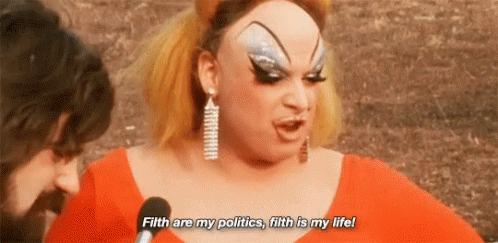Feature your business, services, products, events & news. Submit Website.
Breaking Top Featured Content:
John Waters, Divine, and the Trinity of Trash


Happy Pride Month, queers! Or as I’ve been thinking of it lately, happy Liberation Month. What’s the difference? Oh, just a little filth, crime, and shamelessness.
I recently oozed my way through a rewatch of John Waters’ early films, a trinity of trash from the ’70s composed of the notorious movies Pink Flamingos, Female Trouble, and Desperate Living. Though his most widely-known work today is probably Hairspray, John’s initial films have a gritty grime that goes beyond shocking: Among the highlights are cartoonish cannibal criminals, a singing anus, and an evil queen who gives her subjects rabies. (“I didn’t even know what to put down,” one film censor moans in the documentary Divine Trash.)
But lurking beneath the gleeful mayhem is something honest, and even — against all odds — wholesome. John’s heroes are all entirely shameless, confident, honest about who they are. They’re incapable of feeling unhappy about themselves. When I first watched these movies, many years ago, I thought of them as being proud. But over time, I’ve come to appreciate a distinction between pride (both the lower-case emotion, and the annual upper-case event) and liberation. I think I prefer the latter.
Though we tend to link the Stonewall riots and Pride parades, there was a window between them when different terms jostled for prominence: “Gay Liberation Day” they called the first parade after Stonewall; “Gay Freedom Day” it was called in San Francisco, a city that stubbornly refused to switch to “Pride” until the mid-90s.
It was John Waters’ “Trinity of Trash” that got me thinking about the difference between the terms. If you’re not familiar with the films — well, bless your heart, you must be a very nice person. The rest of us perverts and weirdos are intimately familiar with his work: In Pink Flamingos, a family of creeps battles two evil local abductors for the title of Filthiest Person Alive; in Female Trouble, a teen delinquent dedicates herself to the pursuit of beauty and crime; and Desperate Living is Waters’ most feverish of fever dreams, with a murderess-couple fleeing the suburbs to a fairy-tale slum where an evil queen keeps people imprisoned in their own personal shames, like a Dante Alighieri fable but with full frontal nudity.
Each of these movies centers queer heroines who are entirely shameless, committing one heinous atrocity after another with giant shit-eating grins on their faces. Their acts are childishly hideous, too absurd and abominable to take as serious endorsements — I don’t think anyone believes that John Waters advocates for real-life cannibalism, murder, and stealing giant cuts of beef by hiding them in your crotch.
But I do think his films celebrate taking joy in one’s true nature. “My idea of an interesting person is someone who is quite proud of their seemingly abnormal life and turns their disadvantage into a career,” he wrote in his book Shock Value. Earlier this year, he told the New York Review of Books, “I tried to flip everything: What used to be the villain was the hero in my movies.”
This, at least to me, feels nicer than pride. Don’t get me wrong, I like pride just fine — probably in my top three deadly sins (sorry, avarice). But I think of “pride” as a feeling of accomplishment, that is, the sense that you’ve done something admirable. And as pleasant as that feeling is, sometimes I feel good about something that’s not admirable at all: To bring this back around to Dante, I feel good about slothfully lazing around this weekend and reading a bunch of comic books; I feel good about the lustful websites that I browsed; and I feel particularly good about having gluttonously eaten three donuts in a sitting just because I felt like it.
I’m not proud of any of those things — why would I be? — and many years ago, I would have felt ashamed of them. But now I just feel good. Shameless. If there’s any pride at all to be felt, I suppose I’m proud to have shed the guilt that would have once weighed me down about any of those acts. I’m glad to be liberated from the negativity.
And similarly, I’m glad to be liberated from the negativity that once, many years ago, I felt about being queer. I’m certainly proud of having survived the homophobia of my younger years, and I’m proud of everything that my community has accomplished, and I’m proud of every brave person who stands up to bigots; but at this point am I proud of my gayness itself? Maybe just a little, inasmuch as I can be proud of any fact.
But what feels much more satisfying to me is the sense of liberation from shame. It’s not so much the feeling of pride that I value as it is the feeling of being free. That’s what I see in those trashy John Waters films of the 1970s, and it’s the feeling I’ll bring to Queer Pride, or Queer Liberation, or Queer Freedom, or whatever name feels right for the time.
Continue Reading at PortlandMercury.com here
